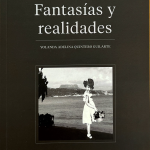Ediciones Nuevos Mundos (Amazon, inédito en Cuba)
Edición bilingüe,
One of my first, most beautiful and unforgettable experiences in Cuba of the seventies, as an Argentine recently introduced to its cultural environment, was the time when a young poet from the eastern part of the country named Carmen Serrano, whom I did not know, invited me to participate in a writers’ meeting in the ancient city of Baracoa. Despite her youth, Carmen was already a prestigious author and very active organizer of literary events. I have never forgotten her loving and supportive hospitality in those days.
Since then, I have followed with great interest the development of her poetic writing which expresses, among its main merits, the freedom and audacity of her creative impulse. From her early verses to the most recent, she appears dissatisfied and distanced from the conventional poetic canons, already so worn out, and eager to produce new sensations and achieve unprecedented effects of meaning. She thus manages to configure a world of images that is very unique and at times even unusual and disturbing: It is a pity that words do not reach far enough/to bring out of the darkness those fearful visions/of dazzlement and other intrigues,/like codes never interpreted to name sensations/ which sometimes resemble love, and other times, dark feelings.
Adding to the reality that surrounds her, Carmen creates a lasting interpretation and metaphorization, always intertwined with her intervening subjectivity. Or, to put it another way, her subjectivity is clearly present in all the content, perceptions and feelings expressed in her poems- she is the protagonist: Listen to my breast trembling in silence, /my hands singing with their bird-like flight,/my eyes tearing through the pages of the verse/and to the body of my soul that aspires to detain you.
This connection between life and work, between thought and word, between feeling and its communication, becomes very visible to us in this new volume, which invites us to read with great excitement. This book will also makes us deeply uneasy because, in some way, its poems tell a harsh story with a stark emotional analysis of life/her life and that of human beings in general- of their/her love and loves with an agonizing conscience because of the inevitable transience of existence: Heart, be discouraged,/you have already lost all rights;/go and be content with the winter of your hour,/do not expect any renewed essence/.…/do not insist,/accept this moment,/tomorrow is no longer yours.
Basilia Papastamatíu, Havana, Cuba, January, 2024
59 pages
Una de mis primeras, más hermosas e inolvidables experiencias en la Cuba de los años setenta, como argentina recién insertada en su medio cultural, fue cuando una joven poeta del oriente del país llamada Carmen Serrano, que yo no conocía, me invitó a participar en un encuentro de escritores en la antigua ciudad de Baracoa, donde ella era ya, a pesar de su juventud, una prestigiosa autora y muy activa organizadora de eventos literarios. Nunca he olvidado su cariñosa y solidaria hospitalidad en esos días.
Desde entonces he seguido con mucho interés el desarrollo de su escritura poética que exhibe, entre sus principales méritos, la libertad y la audacia de su impulso creador. Pude ver así cómo, desde sus primeros versos hasta en los más recientes, se muestra inconforme y distanciada de los cánones poéticos convencionales, ya tan gastados, y deseosa de producir nuevas sensaciones y conseguir efectos inéditos de significado. Logró así configurar un mundo de imágenes muy singular y por momentos hasta insólito y perturbador: Es una pena que las palabras no alcancen/para sacar de las tinieblas esas visiones temerosas/del deslumbramiento y otras urdimbres,/como códigos nunca interpretados para nombrar sensaciones/que unas veces semejan amor y otras, sentimientos oscuros.
Hace además de la realidad que la rodea, una interpretación y una metaforización permanente, atravesada siempre por la intervención de su subjetividad. O, para decirlo de otro modo, su subjetividad está claramente presente en todos los contenidos, percepciones y sentimientos expresados por sus poemas, para resultar siendo entonces su gran protagonista: Escucha a mi pecho temblando de silencio,/a mis manos cantando con su vuelo de pájaro,/a mis ojos rasgando las páginas del verso/y al cuerpo del alma que aspira a detenerte.
Esta conexión entre vida y obra, entre pensamiento y palabra, entre el sentimiento y su comunicación, se nos hace muy visible en este nuevo libro suyo, que ahora nos convoca con sumo placer. Libro que, empero, nos produce también un estremecimiento y un hondo desasosiego porque, de alguna forma, sus poemas parecen hacer una especie de duro recuento y un análisis emocional descarnado de la/su vida y la del ser humano en general, de su querer hacer, de su querer crear y de su querer amar, y con una conciencia agónica por la inevitable fugacidad de la existencia: Corazón, desanímate,/ya perdiste todos los derechos;/anda a contentarte con la nieve de tu época,/no esperes ninguna esencia renovada/.…/no sigas empujando,/acepta esta hora,/ la mañana ya no te pertenece.
Basilia Papastamatíu, La Habana (enero de 2024)



